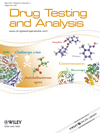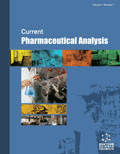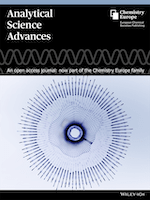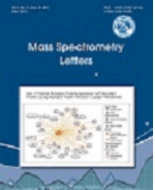
Analytical Science and Technology
Scope & Guideline
Empowering researchers to share transformative findings.
Introduction
Aims and Scopes
- Analytical Method Development:
The journal emphasizes the creation and optimization of new analytical methods, including chromatography, mass spectrometry, and spectroscopy, to enhance accuracy, efficiency, and reliability in various applications. - Environmental and Food Analysis:
A significant focus is placed on the analysis of environmental samples and food products, including the detection of contaminants, nutritional content, and safety assessments to ensure public health and environmental protection. - Biological and Pharmaceutical Applications:
The journal covers studies related to the analysis of biological samples and pharmaceutical formulations, including drug development, pharmacokinetics, and the validation of analytical methods for drug substances. - Material Characterization:
Research on the characterization of various materials, including nanomaterials and polymers, is also a core area, highlighting the importance of analytical techniques in understanding material properties and behaviors. - Interdisciplinary Approaches:
The journal promotes interdisciplinary research that combines analytical science with fields such as biochemistry, environmental science, and forensic science, facilitating a broader understanding of complex analytical challenges.
Trending and Emerging
- Nanotechnology in Analytical Science:
Research on the application of nanomaterials in analytical techniques is on the rise, as these materials offer enhanced sensitivity and selectivity for various analytes, particularly in environmental and biomedical applications. - Sustainable Analytical Methods:
There is an increasing emphasis on developing green and sustainable analytical methods that minimize waste and reduce environmental impact, aligning with global sustainability goals. - Integration of Machine Learning and AI:
The incorporation of machine learning and artificial intelligence into analytical methodologies is gaining traction, providing new insights and improving data interpretation in complex analytical scenarios. - Focus on Microplastics and Contaminants:
A growing number of studies are addressing the analysis of microplastics and emerging contaminants, reflecting heightened awareness of environmental issues and the need for effective monitoring and remediation strategies. - Health and Nutritional Analysis:
Research related to health and nutritional analysis, particularly in the context of food safety and quality, is increasingly prevalent, driven by consumer demand for transparency and safety in food products.
Declining or Waning
- Traditional Chemical Analysis Techniques:
There has been a noticeable decline in studies focusing on traditional wet chemistry methods, as researchers increasingly favor more advanced instrumental techniques that offer greater precision and efficiency. - Non-Spectroscopic Methods:
The use of non-spectroscopic analytical methods has waned, with a growing preference for spectroscopic techniques such as LC-MS/MS and HPLC, which provide more detailed and quantifiable results. - Basic Analytical Techniques in Education:
Research related to the application of basic analytical techniques in educational settings appears to be decreasing, as the focus shifts towards more complex and innovative methodologies that are applicable in cutting-edge research.
Similar Journals

Drug Testing and Analysis
Exploring the Frontiers of Analytical ChemistryDrug Testing and Analysis is a leading scholarly journal published by WILEY, dedicated to advancing the field of drug testing and analytical methods. With ISSN 1942-7603 and E-ISSN 1942-7611, this journal provides a platform for the latest research in Analytical Chemistry, Pharmaceutical Science, and Environmental Chemistry, holding a prestigious reputation reflected in its Q1 and Q2 rankings across various categories in 2023. The journal promotes high-impact studies that explore innovative methodologies, with a specific focus on pharmacological and toxicological analyses, making it an essential resource for researchers, professionals, and students concerned with drug efficacy, safety, and environmental impact. With a strong commitment to quality and relevance, Drug Testing and Analysis remains at the forefront of contemporary scientific inquiry, contributing significantly to both academic and practical advancements in the industry.

Current Pharmaceutical Analysis
Pioneering Analytical Methodologies for Tomorrow's MedicinesCurrent Pharmaceutical Analysis, published by Bentham Science Publishers Ltd, is a vital resource for professionals and researchers in the fields of Pharmaceutical Science, Biochemistry, and Molecular Medicine. Established in 2006, this peer-reviewed journal aims to provide a platform for the latest advancements and analytical methodologies in pharmaceutical research and drug development. Over the years, it has garnered attention for its rigorous scrutiny and contributions to the landscape of pharmacology, evidenced by its quartile placements in various categories, most notably Q3 in Pharmaceutical Science. Despite its current rankings placing it in the lower quartile in several disciplines, the journal remains an essential venue for both emerging and established researchers seeking to disseminate their findings. With the widespread accessibility of its articles, researchers, professionals, and students can engage with cutting-edge studies to foster innovation in pharmaceutical analysis. For access to the latest research contributions, readers can explore the digital archive and stay updated on pivotal discussions shaping the future of the pharmaceutical sciences.

SPECTROSCOPY
Pioneering Insights in Analytical Chemistry and PhysicsSPECTROSCOPY is a vital peer-reviewed journal published by MJH Life Sciences, dedicated to advancing the field of spectroscopy and its applications across various disciplines including analytical chemistry, atomic and molecular physics, and optics. Established with a vision to disseminate cutting-edge research, the journal has a broad scope that encompasses the latest developments, methodologies, and technologies in spectroscopy. Although positioned in the Q4 quartiles for its categories as of 2023, it remains an important resource for researchers and students alike, providing insights into emerging trends and challenges in the field. Issues are published regularly, facilitating knowledge exchange and collaboration among professionals. With access options available in traditional formats, SPECTROSCOPY strives to reach a diverse audience, underscoring its relevance and necessity in today’s ever-evolving scientific landscape. For those in pursuit of innovative solutions and comprehensive analyses in spectroscopy, this journal serves as an indispensable platform.

Analytical and Bioanalytical Chemistry Research
Empowering Global Knowledge in Chemistry.Analytical and Bioanalytical Chemistry Research is an esteemed open-access journal published by the Iranian Chemical Society, dedicated to the advancement of knowledge in the fields of analytical chemistry, biochemistry, and spectroscopy. Since its inception in 2014, this journal has provided a platform for researchers, professionals, and students to publish and access high-quality research articles that contribute to the understanding of chemical analysis and bioanalytical methods. With an ISSN of 2383-093X and an open-access model that promotes global dissemination of findings, it ensures that innovative research reaches a broad audience. The journal has consolidated its presence in the scientific community, currently ranked in quartile Q4 for analytical chemistry, biochemistry, and spectroscopy as of 2023. Its Scopus rankings, including a percentile of 34th in Analytical Chemistry, reflect its commitment to quality research and scholarly contribution. Situated in Tehran, Iran, the journal serves as a vital resource for academic discourse, offering insights into emerging trends and methodologies in analytical and bioanalytical chemistry.

JOURNAL OF ANALYTICAL CHEMISTRY
Shaping the Future of Analytical PracticesJOURNAL OF ANALYTICAL CHEMISTRY, published by PLEIADES PUBLISHING INC, stands as a pivotal resource in the field of analytical chemistry, offering an innovative platform for researchers, professionals, and students to advance their knowledge and contribute to the discourse within the discipline. With an ISSN of 1061-9348 and an E-ISSN of 1608-3199, this journal features a focused exploration of analytical methodologies, instrumentation developments, and applications across various domains, contributing to practical and theoretical advancements in the field. Currently ranked in the Q3 category in Analytical Chemistry with a Scopus rank of #111 out of 156, it provides critical insights and innovation strategies for professionals aiming to enhance their analytical capabilities. Access to the journal is through standard subscription models, and it covers an extensive range of topics pertinent to the discipline from 1996 to 2024. Engage with the JOURNAL OF ANALYTICAL CHEMISTRY to be part of a vibrant research community dedicated to push the boundaries of analytical practices.

LCGC North America
Empowering Innovation in Chromatography and BeyondLCGC North America is a pivotal resource in the field of Analytical Chemistry, published by MJH Life Sciences. Since its inception in 1999, the journal has strived to bridge the gap between scientific research and practical applications, catering to a diverse audience that includes researchers, professionals, and students interested in chromatography and related analytical practices. Although currently categorized in the Q4 quartile of Analytical Chemistry, with a Scopus rank of #137 out of 156, LCGC North America is dedicated to delivering insightful articles that foster discussion and innovation within the analytical chemistry community. With a commitment to quality content, the journal covers a broad spectrum of topics, ensuring that readers remain informed about the latest developments and trends in the field. Despite its non-open access model, readers can access its valuable resources through institutional subscriptions and various library networks, making it a vital asset for those engaged in cutting-edge research and practice. Located in Cranbury, NJ, United States, LCGC North America continues to contribute significantly to the advancement of analytical methodologies and technologies.

CHINESE JOURNAL OF ANALYTICAL CHEMISTRY
Catalyzing Progress in Analytical MethodologiesCHINESE JOURNAL OF ANALYTICAL CHEMISTRY, published by SCIENCE PRESS in China, stands as a prominent platform in the field of analytical chemistry since its inception in 1989. With its ISSN 0253-3820 and E-ISSN 1872-2040, the journal maintains a vital role in disseminating empirical research and innovative methodologies, contributing to the advancement of analytical techniques and their applications. The 2023 Scopus ranking positions the journal in the third quartile (Q3) within its category, reflecting a respectable standing among its peers. Researchers, professionals, and students alike engage with a broad range of topics, from instrumental analysis to environmental monitoring, each aiming to foster further scientific inquiry. Although it does not currently offer Open Access, the journal's rich repository of knowledge continues to be an essential resource for those in the analytical chemistry community, with an enduring commitment to scientific excellence and collaboration.

BMC Chemistry
Driving Scientific Advancement, One Article at a TimeBMC Chemistry, published by BMC, is a reputable open access journal that has made significant strides since its inception in 2019. Operating under e-ISSN 2661-801X, this journal is dedicated to advancing the field of general chemistry by promoting high-quality research across various sub-disciplines. Headquartered in the United Kingdom, BMC Chemistry boasts a commendable impact factor and is classified in Q2 within the prestigious field of Chemistry (miscellaneous) according to the 2023 category quartiles. The journal's Scopus ranking places it at #139 out of 408 in its category, highlighting its growing relevance and influence in the academic community, with a commendable 66th percentile standing. With a commitment to open access, BMC Chemistry ensures that groundbreaking discoveries and innovative research are available to a global audience, fostering collaboration and development in chemistry. Researchers, professionals, and students alike will find this journal to be an invaluable resource for disseminating knowledge and driving scientific advancement.

Analytical Science Advances
Catalyzing Progress in Analytical Chemistry ResearchAnalytical Science Advances is a dynamic journal published by WILEY, dedicated to the ever-evolving field of analytical chemistry. With an ISSN of 2628-5452, this open-access platform aims to disseminate high-quality research and insightful reviews that push the boundaries of analytical methodologies and instrumentation. Since its inception in 2020, the journal has gained traction, securing a commendable Q2 ranking in 2023 within its category, highlighting its significance in the scientific community. Currently positioned at Rank #68 out of 156 in Scopus' analytical chemistry category, it boasts a 56th percentile ranking, reflecting its contributions to advancing analytical techniques. Researchers, professionals, and students will find this journal an invaluable resource for keeping abreast of the latest developments, emerging technologies, and innovative approaches in analytical science, ensuring the journal's relevancy and influence in shaping future discoveries.

Mass Spectrometry Letters
Exploring Innovative Frontiers in Analytical Chemistry.Mass Spectrometry Letters is a pioneering open-access journal published by the Korean Society for Mass Spectrometry, specializing in the diverse fields of analytical chemistry, biochemistry, and spectroscopy. Established in 2010, this journal aims to disseminate groundbreaking research and advancements in mass spectrometry and its applications across various scientific domains. Though currently categorized in the Q4 quartile in key analytical fields, Mass Spectrometry Letters serves as an essential platform for researchers, professionals, and students to share innovative methodologies, emerging trends, and practical applications of mass spectrometry, thus fostering collaboration and advancing knowledge in the scientific community. With a commitment to open access, articles published since 2010 are readily available, enabling widespread distribution and engagement within the international research community. Located in Daejeon, South Korea, and actively converging research through 2024, the journal holds the potential to grow its impact and relevance within the dynamic landscape of mass spectrometry.